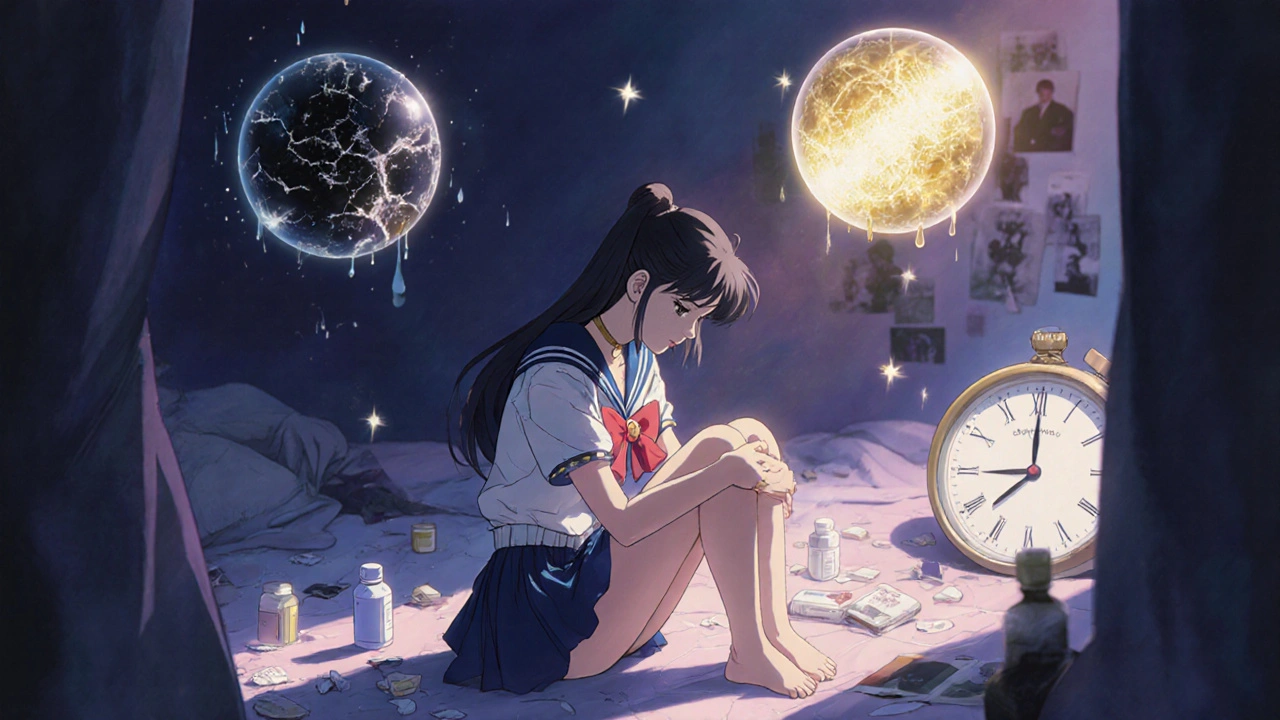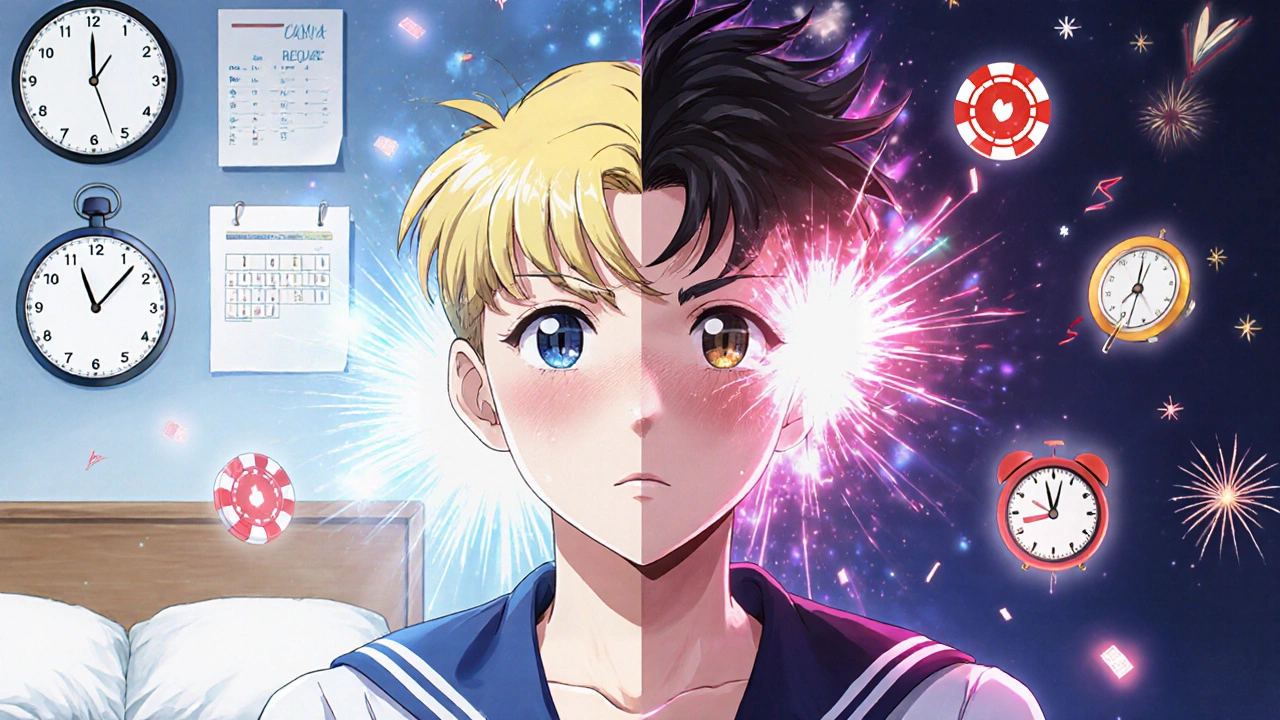Bipolar Depression vs. Unipolar Depression: Key Differences in Diagnosis and Treatment
 Nov, 21 2025
Nov, 21 2025
Getting diagnosed with depression doesn’t tell the whole story. Two very different conditions - bipolar depression and unipolar depression - look almost identical on the surface. Both involve deep sadness, fatigue, trouble sleeping, and loss of interest in life. But the treatments? They’re not just different. One can make the other worse.
What’s the Real Difference?
Unipolar depression, also called Major Depressive Disorder (MDD), means you experience only depressive episodes. No highs. No energy surges. No periods of reckless spending, grand ideas, or sleepless nights fueled by excitement. Just the low. And it can last for weeks, months, even years. Bipolar depression is part of bipolar disorder. People with this condition swing between deep depression and mania or hypomania - a milder but still disruptive version of mania. You might feel euphoric, irritable, or wired for days. You might talk nonstop, take huge risks, or believe you can fly. Then, just as suddenly, you crash back into the dark. The key difference isn’t just mood swings. It’s the presence of mania or hypomania in your history. If you’ve ever had even one episode of elevated mood that lasted four days or more - and it wasn’t caused by drugs or illness - you likely have bipolar disorder, not unipolar depression.Why Misdiagnosis Is Common - and Dangerous
Most people with bipolar disorder first see a doctor during a depressive episode. That’s when they feel broken. When they can’t get out of bed. When they cry all day. Doctors, trained to treat depression, often prescribe antidepressants. It seems logical. But here’s the problem: antidepressants can trigger mania in people with bipolar disorder. Studies show that 30-40% of people initially diagnosed with unipolar depression later turn out to have bipolar disorder - often after they start taking antidepressants and suddenly go into overdrive. One Reddit user shared: “I was on Prozac for seven years. I went from two mood episodes a year to twelve. My psychiatrist finally asked if I’d ever felt ‘too good.’ That’s when everything changed.” Misdiagnosis isn’t just frustrating. It’s costly. People with undiagnosed bipolar disorder spend, on average, 8.2 more years receiving the wrong treatment. Nearly two-thirds of them end up hospitalized because of treatment-induced mania. The National Comorbidity Survey found that 40% of people with bipolar disorder were first diagnosed with unipolar depression. And 90% of them got antidepressants alone - the exact treatment they shouldn’t have.Spotting the Hidden Signs
Not all depression looks the same. Some clues suggest bipolar depression is hiding beneath the surface:- You wake up at 4 a.m. and can’t fall back asleep - and your mood is worst in the morning.
- You feel physically heavy, like your limbs are made of lead - known as “leaden paralysis.”
- You sleep too much, not too little.
- You’ve had sudden, intense mood shifts after starting an antidepressant.
- You have a close relative with bipolar disorder, schizophrenia, or a history of suicide.
- You’ve had periods where you felt “too good” - energetic, confident, impulsive - even if it didn’t seem like a problem at the time.

Treatment: One Size Does Not Fit All
For unipolar depression, the go-to is antidepressants - especially SSRIs like sertraline or escitalopram. About 60-65% of people respond after 8-12 weeks. If that doesn’t work, SNRIs like venlafaxine are next. Therapy like Cognitive Behavioral Therapy (CBT) helps reframe negative thoughts and rebuild routines. But for bipolar depression? Antidepressants alone are risky. They can cause rapid cycling - four or more mood episodes in a year - or trigger full-blown mania. That’s why guidelines from the American Psychiatric Association and the International Society for Bipolar Disorders say: don’t start with antidepressants. First-line treatments for bipolar depression are mood stabilizers and atypical antipsychotics:- Lithium: Reduces depressive symptoms by nearly half compared to placebo. Also cuts suicide risk by up to 80%.
- Quetiapine (Seroquel): One of the most effective for depression in bipolar disorder. 58% of patients improve, versus 36% on placebo.
- Lurasidone (Latuda): Approved specifically for bipolar depression. Works without causing weight gain or metabolic issues.
Long-Term Management: Lifelong vs. Time-Limited
Unipolar depression often allows for treatment breaks. If you’ve had one episode and stayed well for six to twelve months, your doctor might suggest slowly stopping medication - especially if therapy and lifestyle changes are working. Bipolar disorder? That’s different. Stopping mood stabilizers is like turning off a fire alarm. Within five years, 73% of people who quit their meds have another episode. Only 37% stay stable if they continue treatment. Lifelong medication isn’t about being “addicted” - it’s about preventing collapse. That’s why lithium, despite its side effects, remains a cornerstone. It’s the only medication proven to reduce suicide risk in bipolar disorder. Regular blood tests are needed, but for many, the trade-off is worth it.The Genetic and Scientific Overlap
Science now shows that unipolar and bipolar depression aren’t completely separate. Genetic studies reveal a strong link - the same genes that raise risk for depression also raise risk for bipolar disorder. One 2019 study found a correlation of 0.72 between the two, meaning they share nearly three-quarters of their genetic roots. Some experts, like Dr. Kay Redfield Jamison, argue that many cases of “unipolar” depression are actually mild forms of bipolar disorder. Others, like Dr. Michael First (a DSM-5 editor), say only 10-15% of unipolar patients ever develop mania. The truth? We’re still learning. The DSM-5-TR (2022) now includes a “with mixed features” specifier for depression - meaning someone can have depressive symptoms plus a few signs of mania (like racing thoughts or irritability) without full-blown episodes. This acknowledges the spectrum, even while keeping diagnostic boundaries for treatment purposes.
What’s New in Treatment?
In recent years, new options have emerged:- Esketamine (Spravato): A nasal spray approved in 2019 for treatment-resistant unipolar depression. Works fast - some feel better in hours.
- Cariprazine (Vraylar): Approved in 2019 for bipolar depression. Helps lift mood without triggering mania.
- Digital phenotyping: Apps that track sleep, voice tone, typing speed, and location patterns to predict mood shifts before they happen.
- Gene expression tests: A 2023 study identified a 12-gene profile that distinguishes bipolar from unipolar depression with 83% accuracy. Not yet routine, but coming fast.
What Should You Do If You’re Unsure?
If you’ve been diagnosed with unipolar depression but:- Antidepressants didn’t help - or made things worse
- You’ve had sudden energy bursts, risky behavior, or sleepless nights
- You have a family history of bipolar disorder or suicide
- You’ve had multiple depressive episodes over the years
Final Thought: Diagnosis Is the First Step to Healing
Depression is heavy enough without being treated for the wrong condition. Bipolar depression and unipolar depression aren’t the same. They’re not even close. The tools, the meds, the long-term plan - they’re built on different foundations. Getting it right isn’t about labels. It’s about survival. It’s about not spending years stuck in the dark because the key didn’t fit the lock. Know your history. Track your moods. Ask questions. And if something doesn’t feel right - push for answers. Your life depends on it.Can you have bipolar depression without ever having mania?
No. By definition, bipolar depression is part of bipolar disorder, which requires at least one past episode of mania or hypomania. If you’ve only ever had depressive episodes, you have unipolar depression (Major Depressive Disorder). But many people don’t recognize their past hypomanic episodes - they feel like “good productivity phases” or “just being myself.” That’s why asking about family history, sleep patterns, and past behavior changes is critical.
Do antidepressants always cause mania in bipolar people?
Not always, but the risk is high enough to avoid them as a first-line treatment. Studies show that 76% of bipolar patients on antidepressants without mood stabilizers experience mood destabilization - meaning more episodes, faster cycling, or full mania. That’s why guidelines say: never start an antidepressant alone in bipolar disorder. If used at all, they must be paired with a mood stabilizer like lithium or lamotrigine.
Is bipolar depression harder to treat than unipolar depression?
Yes - but not because it’s more severe. It’s harder because the treatment options are more limited and riskier. Antidepressants can’t be used freely. Many mood stabilizers have side effects. Finding the right combo often takes time and trial. But once the right treatment plan is in place, long-term outcomes can be excellent. The key is early, accurate diagnosis.
Can lifestyle changes help with bipolar depression?
Absolutely - but not as a replacement for medication. Regular sleep, avoiding alcohol, managing stress, and keeping daily routines are critical. Research shows that people who stick to consistent sleep-wake cycles have fewer episodes. Interpersonal and Social Rhythm Therapy (IPSRT) helps people build these habits. It’s not about willpower - it’s about biology. Your brain needs rhythm to stay stable.
How do I know if my doctor is taking bipolar disorder seriously?
Ask them directly: “Have you ruled out bipolar disorder?” and “Have you asked about past episodes of high energy, reduced sleep, or impulsive behavior?” A good clinician will use screening tools like the MDQ or HCL-32, ask about family history, and avoid prescribing antidepressants alone. If they dismiss your concerns or push quick fixes without exploring your full history, it’s time to seek a second opinion - preferably from a psychiatrist who specializes in mood disorders.

Pramod Kumar
November 22, 2025 AT 23:53Man, this hit different. I used to think my 'good phases' were just me being productive - turns out I was hypomanic and didn't even know it. My doctor prescribed SSRIs for 'depression' and I ended up working 20-hour days for three weeks straight, spending rent money on crypto, then crashing into a week where I couldn't get off the couch. Took me two years to get the right diagnosis. Don't let anyone tell you 'it's just stress.' If you've ever felt like you could fly… then crashed into a black hole - get screened. You're not broken. You're just misdiagnosed.
Brandy Walley
November 24, 2025 AT 07:08shreyas yashas
November 24, 2025 AT 11:14Brandy’s comment made me laugh but also sigh. I get why people say that - I used to think my ‘good days’ were just me being normal. Then I realized those were the days I didn’t sleep, talked nonstop, bought three laptops I didn’t need, and thought I was gonna start a startup with Elon. Looking back? Classic hypomania. Not confidence. Not hustle. Just my brain glitching. And yeah, antidepressants made it worse. Now I’m on lithium and I sleep like a baby. No magic pill. Just the right one.
Suresh Ramaiyan
November 24, 2025 AT 23:48This post is one of the clearest explanations I’ve ever read on the difference between bipolar and unipolar depression. I’ve been on both sides of the fence - first diagnosed with MDD, then later with bipolar II after a near-miss hospitalization. The scariest part? No one asked me about my ‘good spells.’ They asked if I was sad. That’s it. We need more doctors who know to ask: ‘Have you ever felt too good?’ Not ‘are you okay?’ - but ‘did you ever feel like you didn’t need sleep or food because you were just… on fire?’ That’s the question that saves lives. Also, lithium isn’t a punishment. It’s a lifeline. And yes, blood tests suck. But so does losing three years of your life to misdiagnosis.
Katy Bell
November 25, 2025 AT 03:54I cried reading this. Not because I’m dramatic (okay maybe a little) - but because I spent 8 years thinking I was just ‘a moody person.’ I’d get ‘productive’ in the winter, stay up till 5am writing novels, then crash into a hole where I couldn’t shower for days. My therapist called it ‘cyclical depression.’ Turns out, I had hypomania. I didn’t know ‘too good’ was a symptom. I thought it was just being ‘me.’ Now I’m on lamotrigine, tracking my sleep, and I haven’t had a full episode in 14 months. It’s not perfect. But it’s mine. And I’m not broken anymore.
Ragini Sharma
November 26, 2025 AT 10:56Linda Rosie
November 27, 2025 AT 22:39Vivian C Martinez
November 29, 2025 AT 14:53Reading this made me feel seen. I was told I had ‘treatment-resistant depression’ for years. I tried six meds. Nothing worked. Then I finally saw a mood specialist who asked, ‘Have you ever felt like you didn’t need to sleep for days?’ I said, ‘Yeah, but I thought that was just being productive.’ She looked at me and said, ‘That’s not productivity. That’s hypomania.’ I cried in her office. Not because I was sad - because I finally had a name for what I’d been living with. Now I’m on quetiapine and IPSRT. My sleep schedule is rigid. I don’t drink. I don’t skip meals. It’s boring. But it’s safe. And I’m alive. That’s enough.
Ross Ruprecht
November 30, 2025 AT 07:37Bryson Carroll
December 1, 2025 AT 11:31